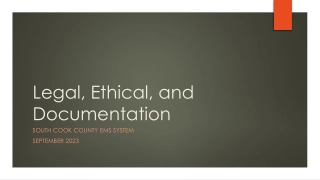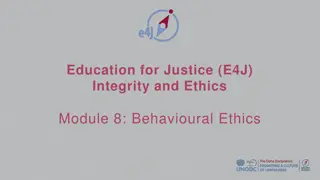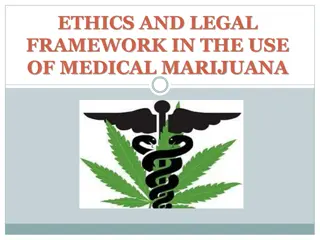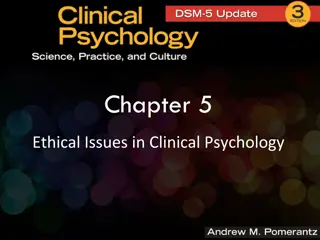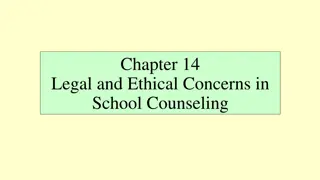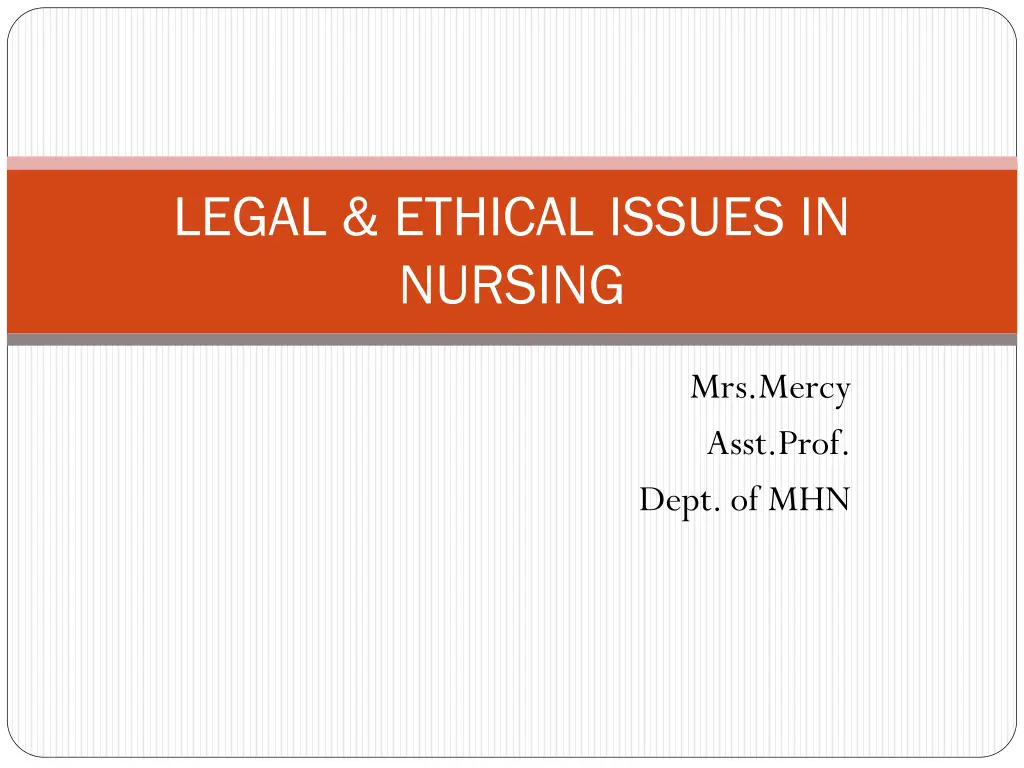
Nursing Ethics: Importance and Guidelines
Explore the significance of ethics in nursing, including definitions of ethics, code of ethics, and the need for nursing ethics. Learn how ethics govern right conduct and protect patients' rights, guiding nurses in ethical decision-making.
Download Presentation

Please find below an Image/Link to download the presentation.
The content on the website is provided AS IS for your information and personal use only. It may not be sold, licensed, or shared on other websites without obtaining consent from the author. If you encounter any issues during the download, it is possible that the publisher has removed the file from their server.
You are allowed to download the files provided on this website for personal or commercial use, subject to the condition that they are used lawfully. All files are the property of their respective owners.
The content on the website is provided AS IS for your information and personal use only. It may not be sold, licensed, or shared on other websites without obtaining consent from the author.
E N D
Presentation Transcript
LEGAL & ETHICAL ISSUES IN NURSING Mrs.Mercy Asst.Prof. Dept. of MHN
INTRODUCTION INTRODUCTION From we were very young we began to learn what was right and what wrong behavior was. We learned this from our parents, relatives, friends and teachers. By the time we became adults,we had a personal set of ethics to guide our behavior in daily life. We may believe, for example, that honesty is important and necessary and important.We will try to be honest because we believe it is right to do so. Being dishonest would then be wrong for us.This is ethical behavior.
ETHICS ETHICS- - Definition Definition Ethics refers to the moral code for nursing and is based on obligation to service and respect for human life.-Melanie and Evelyn. Ethics are the rules or principles that govern right conduct and are designed to protect the rights of human beings. - Sister Nancy
CODE OF ETHICS CODE OF ETHICS Definition; 1. A code of ethics is a set of ethical principles that are accepted by all members of a profession. -Potter and Perry 2 Code of ethics is a guideline for performance and standards and personal responsibility. -Lillie M S and Juanita Lee 3. Code of ethics provides a frame work for decision making for the profession and should be oriented toward the day to day decisions made by members of the profession. - Chitty K K
Nursing Ethics Nursing Ethics It s a branch of applied ethics that concerns itself with activities in the field of nursing. Its refers to ethical standards that govern and guide nurses in every day practice such as being truthful with confidentiality ,and advocating on behalf of the client clients ,respecting client
Need for nursing ethics Need for nursing ethics Helps the students/ RN to practice ethically Helps the nurse to identify the ethical issues in her work place Protecting patients right and dignity Providing care with possible risk to the nurses health Staffing patterns that limit the patients access to nursing care Ethical reasoning Helps the nurse to respond to ethical conflicts Helps to differentiate right /wrong behavior Guide for a professional behavior Help teachers plan education. Prevent below standard practice. Protect a nurse if falsely accused and guide direction for legal action
Key Principles of ethics in health care Key Principles of ethics in health care system system
Autonomy-The right of self determination, independence and freedom. Right to health care decision. Justice-Obligation to be fair with all people. Fidelity- Obligation of an individual to be faithful to the commitment made to himself, and to others. It is the main support of accountability. Veracity: -The duty to tell the truth.
Beneficence- Doing good for the client. What exactly is good for one person may not be the same for others. Malaeficence- is the requirement that health care providers do no harm to their client either intentionally or unintentionally Deontological:-What causes a good outcome is good action. Situational: -What causes a good outcome is good action.
I.C.N CODE OF ETHICS FOR I.C.N CODE OF ETHICS FOR NURSES(1993) NURSES(1993) In 1953 ICN adopted its first code of ethics for nurses and was revised in 2000. The four principle elements contained within the ICN code involve standards related to nurses and people,practice,profession and co workers. ICN recommended that nurses have 4 fundamental responsibilities i.e. to promote health, to prevent illness, to restore health and to alleviating suffering. And also inherent in nursing is respect for human rights, like right to life, to dignity and to be treated with respect. And the care should not be restricted by age, sex, color, creed, culture or nationality.
Nurses and people Nurses and people The nurse s primary responsibility is to those people who require nursing care. The nurse in providing care promotes an environment in the values, customs, and spiritual beliefs of the individual are respected .the nurse holds in confidence personal information and use judgement in sharing this information.
Nurses and practice Nurses and practice The nurse carries personal responsibility for nursing practice and for maintaining competence by continual learning. The nurse maintains the highest standard of nursing care possible within the reality of a specific situation. The nurse uses judgement in relation to individual competence when accepting and delegating responsibilities. The nurse when acting in professional capacity should at all times maintain standards of personal conduct which credit up on the profession.
Nurses and co Nurses and co- -workers workers The nurse maintains a cooperative relationship with co- workers in nursing and other fields. The nurse takes appropriate action to safeguard the individual when his care is endangered by a co-worker or any person.
Nurses and the profession Nurses and the profession The nurses play a major role in determining and implementing desirable standards of nursing practice. The nursing is active in developing a core of professional knowledge. The nurse acting through the professional organizations participates in establishing and maintaining equitable social and economic working conditions in nursing.
CODE OF PROFESSIONAL CONDUCT CODE OF PROFESSIONAL CONDUCT Code of professional conduct (for nurses in India) PROFESSIONAL RESPONSIBILITY AND ACCOUNTABILITY To maintain professional responsibility and accountability, the nurse a. Appreciates a sense of self-worth and nurtures it. b. Maintains standards of professional conduct, reflecting credit upon the profession. c. Carries out responsibilities within the frame work of professional boundaries. d. Is accountable for maintaining practice standards set by the I.N.C. e. Is accountable for his or her actions. f. Is compassionate. g. Practices healthful behavior. h. Is responsible for continuous improvement of current practices.
NURSING PRACTICE a. In the course of practice of nursing, the nurse b. Provide care in accordance with set standards of practice. c. Treats all individual and family with human dignity in providing the physical, psychological, emotional, social and spiritual aspects of care.
Respects individuals and families in the context of traditional and cultural practices, promoting healthy practices, and discouraging harmful practices. e. Presents realistic pictures truthful in all situations for facilitating autonomous decisions making by individuals and families. f. Promote participation of individuals and significant others in the care. g. Ensures safe practice.
COMMUNICATION AND INTER COMMUNICATION AND INTER PERSONAL RELATIONSHIPS PERSONAL RELATIONSHIPS This plays a key role in the interaction of the nurse with his or her clients. To effect optimal interaction, the nurse a. Establishes and maintains effective IPRs with individuals, families and communities. b. Upholds the dignity of team members and maintains effective IPR with them. c. Appreciates and nurtures the professional role of team members. d. Co-operates with other health professionals to meet the needs of the individuals, families and communities.
VALUING HUMAN BEINGS VALUING HUMAN BEINGS The nurse values human life, She a) Takes appropriate action to protect individuals from harmful unethical practices. b) Considers relevant facts while taking conscientious decisions in the best interest of individuals. c) Encourage and supports individual in their right to speak for themselves on issues affecting health and welfare. d) Respect and supports choices made by individuals.
MANAGEMENT MANAGEMENT Ensures appropriate allocation and utilization of available resources. b) Participates in super vision and education of students and other formal providers. c) Uses judgment in relation to individual competence while accepting and delegating responsibility. d) Communicates effectively following appropriate channels of communication. e) Participates is performance appraisal. f) Participates in evaluation of nursing services. g) Participates in policy decision, following the principles of equity and accessibility of service.
PROFESSIONAL ADVANCEMENT PROFESSIONAL ADVANCEMENT Ensures the protection of human rights, while pursuing the advancement of knowledge b. Participate in determining and implementing quality care. c. Take responsibility of updating one s own knowledge and competencies. d. Contribute to the core of professional knowledge and conducting and participating in research. e. The nurses responsibility for the patient has been changed to a broader term of people. This includes respect for culture, customs, religious beliefs and confidential treatment of personal information. One of our greater adjustments in nursing is accepting responsibility for our own professional behavior.

